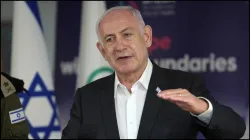Netanyahu dissolves War Cabinet tasked to oversee Gaza conflict after key partner Benny Gantz's departure
Benny Gantz, Netanyahu's longtime rival, had joined the government after the October 7 attack and demanded the establishment of a small cabinet to sideline far-right members of the government. He left the government in early June, citing frustration with Netanyahu's handling of the war.

Jerusalem: In a major development, Israeli Prime Minister Benjamin Netanyahu has dissolved the influential War Cabinet tasked to oversee the eight-month conflict in the Gaza Strip, according to officials. The cabinet was dissolved following the departure of key opposition lawmaker Benny Gantz, which made Netanyahu more dependent on his far-right allies.
Gantz, Netanyahu and Defence Minister Yoav Gallant were its members and made key decisions together throughout the war. Gantz was a longtime rival of Netanyahu and had joined the government as a show of unity after the Hamas-led attack on October 7 and demanded the establishment of a small War Cabinet to sideline the far-right lawmakers of the Israeli government.
However, Gantz withdrew from the government earlier this month after mounting frustrations with Netanyahu's handling of the war. Gantz’s absence makes Netanyahu more dependent on his ultranationalist allies to govern, who are calling for expanding Israeli settlements in Palestinian territories and resisting a two-state solution pushed by several countries including the United States and India, and the dissolution of the War Cabinet indicates that such a shift is now underway.
What will Netanyahu do now?
The War Cabinet was formed in the early days of the war and made up of three members - Gantz, Netanyahu and Gallant. Gantz’s departure, while not posing a direct threat to Netanyahu’s rule, rocked Israeli politics at a sensitive time, as he was quite popular who is credited for boosting Israel's credibility with its international partners at a time when Israel was getting increasingly isolated.
Now, officials speaking on the condition of anonymity claim that Netanyahu would hold smaller forums for sensitive issues surrounding the war, which includes his security Cabinet, comprising far-right governing partners who oppose ceasefire deals and have voiced support for reoccupying Gaza. This could possibly deepen an apparent rift between the US and Israel - two close allies - as US President Joe Biden has also expressed discontentment with Netanyahu's handling of the conflict.
Netanyahu’s government is Israel’s most religious and right-wing ever. In Israel’s fractious parliamentary system, Netanyahu relies on a group of small parties to help keep his government afloat and without the support of Gantz’s party, Netanyahu could be more beholden to the far-right allies who have repeatedly pledged to topple the government if their demands are not met. This has led critics to believe that Netanyahu's decisions are influenced by the ultranationalists, which he has denied.
What is happening in the war?
In separate news, Israel's military has announced a "tactical pause" throughout daytime hours along a route in southern Gaza to clear the way for humanitarian aid deliveries for desperate Palestinians who are enduring a severe humanitarian crisis sparked by the eight-month war. This decision came after eight soldiers were killed in southern Gaza in the deadliest attack on the Israeli forces in months.
The halt applies to about 12 km of the road in Rafah and falls far short of a complete ceasefire in the beleaguered territory that has been sought by the international community, including Israel's top ally, the United States. If it holds, the limited halt in fighting could help address some of the overwhelming needs of Palestinians that have surged even more in recent weeks with Israel's incursion into Rafah.
The army said the pause would begin at 8 am (local time) and remain in effect until 7 pm. It said the pauses would take place every day until further notice. The pause is aimed at allowing aid trucks to reach the nearby Israel-controlled Kerem Shalom crossing, the main entry point for incoming aid, and travel safely to the Salah a-Din highway, a main north-south road, the military said. The crossing has suffered from a bottleneck since Israeli ground troops moved into Rafah in early May.
(with inputs from AP)
ALSO READ | Israel announces 'tactical pause' in fighting to ramp up aid after 8 soldiers killed in Gaza